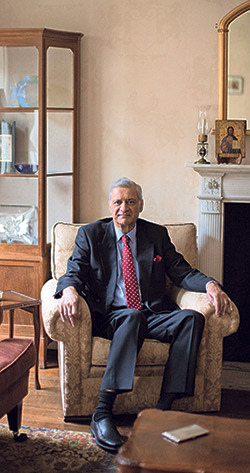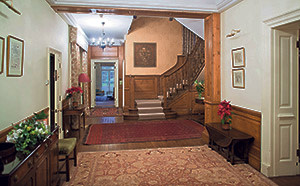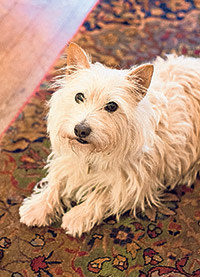Why the Commonwealth is force for good – by its secretary-general

Roula Khalaf, Editor of the FT, selects her favourite stories in this weekly newsletter.
On this side is a Syrian, the uncle of Assad, and on my other side is a prince from Saudi Arabia, he was governor of Riyadh,” says Kamalesh Sharma, secretary-general of the Commonwealth, as if recalling a bizarre diplomatic summit. “Next to him is an Indian, who’s ventured into mining . . . next to him is a Pole and then an American.” In fact, Sharma is standing on the top landing of his official residence, a splendid red-brick Edwardian mansion on a discreet backstreet in London’s Mayfair district, and he is reeling off a list of his near neighbours. “We know they are there when the security detail hits the street,” he adds.
Now in his second term in office, Sharma – together with his wife, Babli – has lived in this sprawling, four-storey house for the past six years, from where he commutes to the Commonwealth offices in Marlborough House on Pall Mall.
Given all the associated grandeur, it is perhaps not surprising that many diplomats consider the role of secretary-general to be a plum job, but it is one that has come under increasing scrutiny in recent months. Damning criticism of Sharma’s decision to stage the Commonwealth Heads of Government Meeting (CHOGM) in Sri Lanka last November – despite concern over the country’s human rights record – has sparked a debate over the organisation’s role in international affairs.
Over cups of tea in the drawing room, a space furnished in restrained creams and beige, Sharma argues for the Commonwealth’s relevance in the modern world. “The extraordinary thing about it is its variety,” he says, listing old colonial powers, such as Canada and Australia, and emerging economies, including Nigeria and Malaysia, among the 53 member states. “It’s actually a microcosm of the whole world [and so] it’s instantly, potentially, a global product.”
He continues: “I’ve been told openly by the [Organisation internationale de la] Francophonie, that it was the Commonwealth example which then led to the creation of the Francophonie. But it’s not the same – it grew in a very organic way and in a moment of time. It cannot be recreated.”

Sharma points to the foresight of Jawaharlal Nehru, the first prime minister of India, who was able to put “frictional history” behind him during discussions with Clement Attlee, King George VI and others in the late 1940s, which resulted in the founding of the Commonwealth. “This recognition is an extraordinary thing. This is what gives the special character to the Commonwealth. This was a huge leap of statesmanship and wisdom.”
Born in India in 1941, Sharma grew up against the backdrop of Nehru’s leadership. He studied at St Stephen’s College, Delhi, and read literature at Cambridge university before joining the Indian Foreign Service in 1965. Throughout the house there are mementos and works of art that he has collected while on diplomatic postings. A collection of small icons, purchased during his stint as the first Indian ambassador to Kyrgyzstan and Uzbekistan, decorate a far wall. Calligraphic pages from a 16th-century Koran are displayed near a fine silk weaving from the city where Sharma grew up. “Benares [Varanasi] is a town where Hindus are very happy to pass on to their next lives. I got it wrong – I was born in Benares,” he says, smiling.

We walk through to the dining room, where there are views on to a spacious communal garden, and are joined moments later by the couple’s white Cairn terrier cross named Khoya (a Hindi word meaning “lost”), which they bought from Battersea Dogs and Cats Home. While Khoya competes for attention, Sharma points out Asian artworks, from antique Chinese scrolls to delicate Japanese prints. As well as a stint in Delhi during the 1970s, Sharma spent two years as then UN secretary-general Kofi Annan’s special representative to East Timor between 2002 and 2004. “We’ve got enough [art] now to make this into a kind of Far Eastern room.”
When reflecting on his varied career, Sharma is likely to be frustrated by events of the past year. Fallout from the CHOGM controversy has been compounded by Whitehall’s decision to impose cuts of £3m over two years from its grant to the Commonwealth Secretariat. Yet, when questioned again on his decision to press ahead with CHOGM, a move that prompted boycotts from Canadian prime minister Stephen Harper and India’s Manmohan Singh, Sharma is forthright. “I have to be very much guided by the sentiment of the membership and [this] was very clear on two points. The first one was that you must strive to make the summit itself as successful and productive as possible, in its own right,” he says. “As far as issues pertaining to Sri Lanka in so far as human rights, and so on, was concerned, the sentiment was equally clear – engage with Sri Lanka in the spirit of the Commonwealth and see what, in partnership with the member state, advances we can make.”

Surely his decision to proceed has, at the very least, damaged the reputation of the Commonwealth? “I don’t really think so,” he says. “I sense by talking to people that more and more people are of the view that the right thing was done, because they say the Commonwealth stayed together, a united house, and by staying together you are able to get outcomes.”
In 2012, to mark the Queen’s diamond jubilee, the Commonwealth consolidated its guiding values in an official charter. But although it states a shared commitment to human rights, about half of member countries use capital punishment and 42 of the 53 member countries criminalise homosexuality. Critics point to the inherent weakness of a voluntary organisation, but Sharma argues that soft power can be a force for political change, referring to the results of last October’s Ibrahim Index of African Governance (IIAG). “When you look at the first ten in the ranking, eight are from the Commonwealth. This can’t be by accident. It’s because they take these values, which they have done in their own region, seriously.”
If member countries object to Commonwealth influence, they can simply leave, as Gambia did last October, 48 years after joining. In his announcement, Gambian president Yahya Jammeh, whose authoritarian regime has led to fraught relations with the UK, accused the organisation of being a “neocolonial” institution. Sharma is dismayed by the move but he takes a long view. “It’s a modern Commonwealth – it works for everybody. People are pretty confident that the time will come when Gambia will want to rejoin the Commonwealth.”

Eager to show me some positive examples of diplomacy, Sharma leads the way down the main staircase, past a large picture of Ganesh (“a deity of auspiciousness, so we put him up front”), to his ground-floor study, where he produces a series of treasures from the bottom of a cupboard.
“This is written around 1790 by the first governor-general of England in Calcutta,” he says, handing me a framed fragment of sepia flourishes. “He was a very, very famous man in Indian history. I was amazed I managed to get this at auction for £100. In India people wouldn’t believe I own a letter by Warren Hastings . . . These are letters which he has written to the chief justice of Bengal. He is saying would you receive somebody . . . He was doing this politics all the time.”
Sharma’s collection also includes letters written by Charles Dickens and Mark Twain, and he shows off another by the 18th-century Sanskrit scholar William Jones. Last of all, he produces a signed cricket bat. Once a keen sportsman himself, Sharma is looking forward to the Commonwealth Games in Glasgow this summer and he dismisses the suggestion that political campaigning ahead of the vote on Scottish independence could overshadow the event. Sport has long been a focus for the organisation’s Youth Programme. “We don’t regard sports as merely a theatre for excitement or for awarding prizes, but sports as integral to the way you live your life and with all the values that go with it,” he says.
With just two years left in the job, Sharma is looking forward to spending more time with his two children and three grandchildren, having so far “failed spectacularly to retire”, but there is still a great deal more work to be done if he is to leave a lasting legacy.

“The Commonwealth, particularly in London, deserves to be better known and understood, and I see that as a primary responsibility,” he says. “This institution just simply has to be seen for the great global good that it does.” The weight of expectation must be growing heavy upon his shoulders.
——————————————-
Favourite thing
One of Sharma’s favourite things is a pristine Gray-Nicolls cricket bat inscribed to him by the former West Indian international cricketer Brian Lara. “I introduced him to the Queen on Commonwealth Day [in 2010],” says Sharma, swinging a forward defensive stroke, “and he was so grateful, he said ‘Here is something for you’.”
Laura Battle is deputy editor of House & Home
Comments